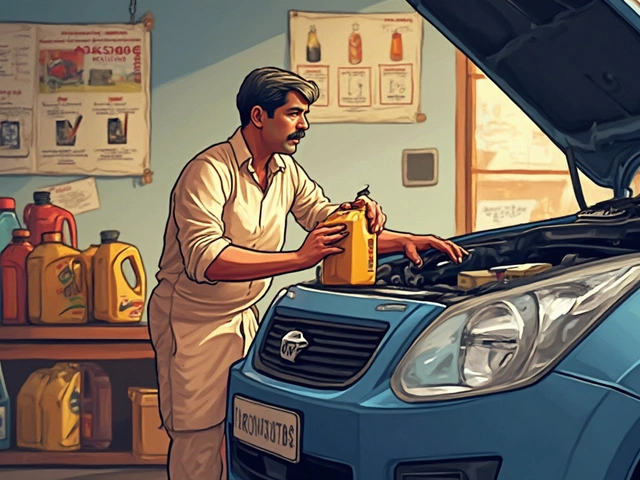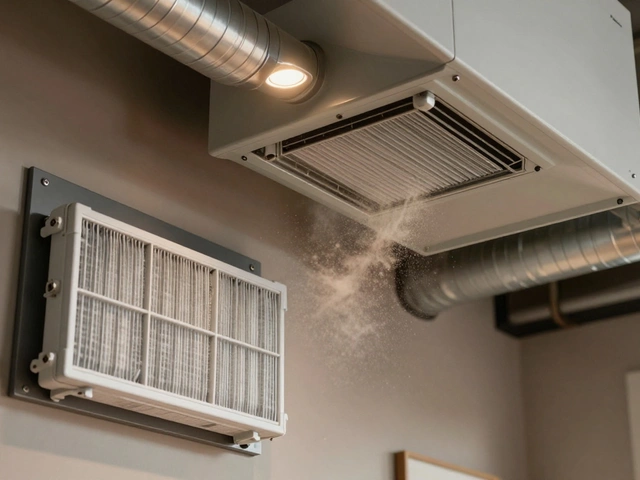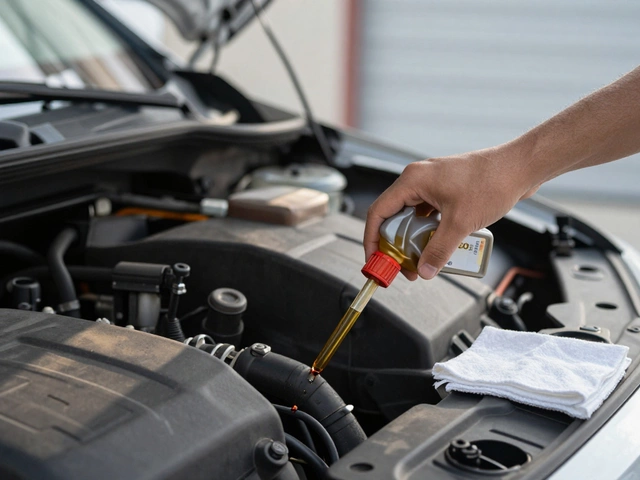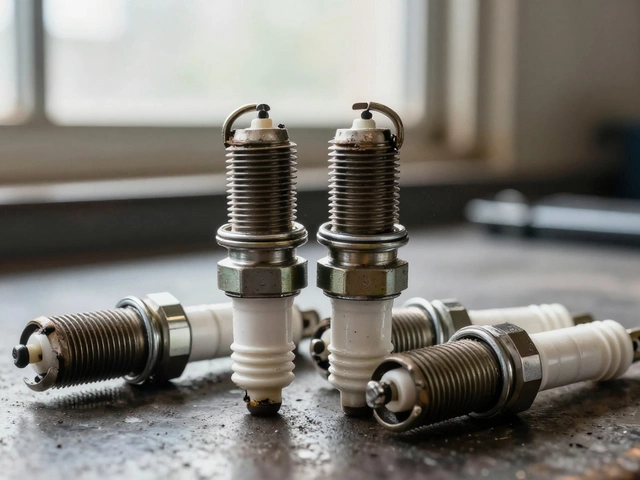
Fuel Pump Sound Diagnostic Tool
Identify Your Fuel Pump Sound
Select the sound you're hearing to get a diagnostic analysis based on the article's guidance.
Diagnostic Results
Select a sound and click "Diagnose My Sound" to see your results.
When your car starts making an odd whine or a sudden click, you might wonder if the failing fuel pump sound is the culprit. It’s easy to dismiss strange noises as harmless, but a misbehaving fuel pump can quickly leave you stranded. This guide breaks down exactly what a bad fuel pump sounds like, why those noises happen, and how to tell if you need a quick fix or a full replacement.
Key Takeaways
- A healthy fuel pump runs almost silently; any noticeable whine, humming, or clicking usually signals trouble.
- Sound type correlates with specific issues: high‑pitched whining points to wear, intermittent clicks hint at electrical problems, and low rumbling often means low fuel pressure.
- Listen both when the engine is idling and when you press the accelerator - the difference tells you a lot about pump health.
- Early diagnosis can save you from costly engine damage and unexpected breakdowns.
- Basic tools like a mechanic’s stethoscope or a simple test with a handheld diagnostic scanner can confirm the problem before you visit a garage.
What a Healthy Fuel Pump Sounds Like
First, let’s set the baseline. A properly functioning fuel pump, typically located inside the fuel tank, produces a faint, almost inaudible hum that blends with the rest of the engine’s noises. In most modern cars, this hum is masked by the radiator fan, the air‑conditioning compressor, and the exhaust.
Because the pump is submerged in fuel, the liquid acts as a sound dampener. When you sit in the driver’s seat with the engine running, you might hear a gentle thrum, but nothing sharp or high‑pitched.
Common Sounds of a Failing Fuel Pump
When the pump starts to deteriorate, the sound changes. Below are the most frequently reported noises, each linked to a specific failure mode.
| Sound | Likely Cause | Urgency |
|---|---|---|
| High‑pitched whining (increasing with RPM) | Worn internal bearings or impeller damage | High - replace soon |
| Low, rattling hum that fades on acceleration | Low fuel pressure, possible pump cavitation | Medium - check fuel filter and pressure |
| Irregular clicking or ticking | Electrical relay failure or pump motor seizure | High - risk of total pump loss |
| Sudden sputtering followed by a thud | Fuel starvation due to pump failure, often after start‑stop | Critical - engine may stall |
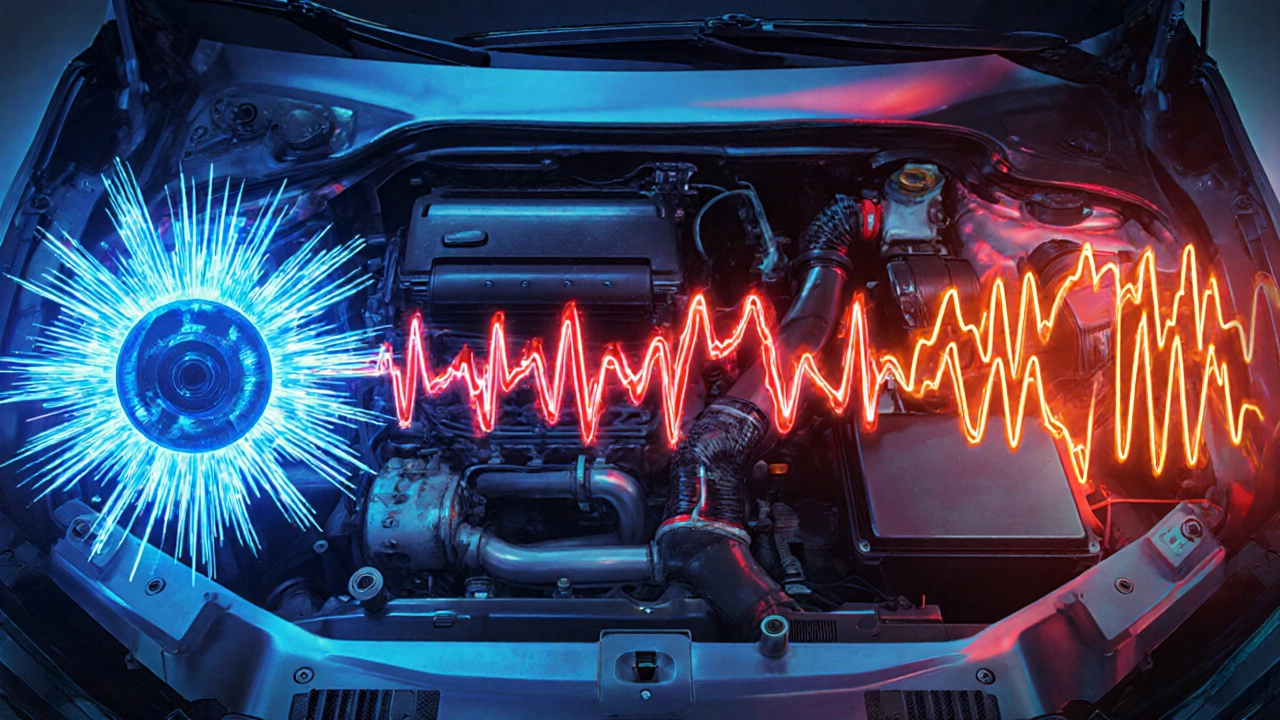
How the Sound Relates to Engine Performance
Each noise you hear translates into a measurable symptom on the road. A high‑pitched whine usually means the pump is struggling to maintain pressure, which can cause the engine to hesitate during acceleration. Clicking noises often precede a complete loss of fuel delivery, leading to stalls or a no‑start condition.
Conversely, a low hum that disappears when you step on the gas often signals that the pump is still delivering enough fuel at idle but can’t keep up under load. This is why you might notice a slight stumble when merging onto a highway.
Diagnosing the Noise Yourself
Before you pay a garage, you can confirm whether the sound is truly coming from the pump. Here’s a simple step‑by‑step process you can try in a safe, well‑ventilated area.
- Open the hood and locate the fuel pump relay in the fuse box (refer to your owner’s manual).
- Using a mechanic’s stethoscope a small handheld device for isolating engine noises, place the sensor on the fuel tank’s side (if accessible) or on the fuel rail under the car.
- Start the engine and listen for any of the four sounds listed above. Note if the noise changes when you rev the engine.
- If you have a handheld diagnostic scan tool a device that reads OBD‑II codes and live sensor data, check the fuel pressure reading. Normal pressure typically ranges between 30-45 psi for most gasoline engines.
- Record your observations and compare them to the table of sounds. If you hear a high‑pitched whine or clicking, it’s safest to schedule a professional inspection.
When to Call a Mechanic
Even with the best DIY checks, some issues demand a trained eye. Call a mechanic if you encounter any of these red flags:
- The engine stalls repeatedly while driving. \n
- You notice a strong, continuous whining that gets louder with speed.
- The check engine light flashes with codes P0230 (fuel pump primary circuit) or P0231 (fuel pump secondary circuit).
- Fuel pressure readings are consistently below the manufacturer’s minimum.
Professional mechanics have pressure testers that can isolate the pump from the fuel lines, confirming whether the pump itself or a downstream component (like a fuel filter or injector) is at fault.
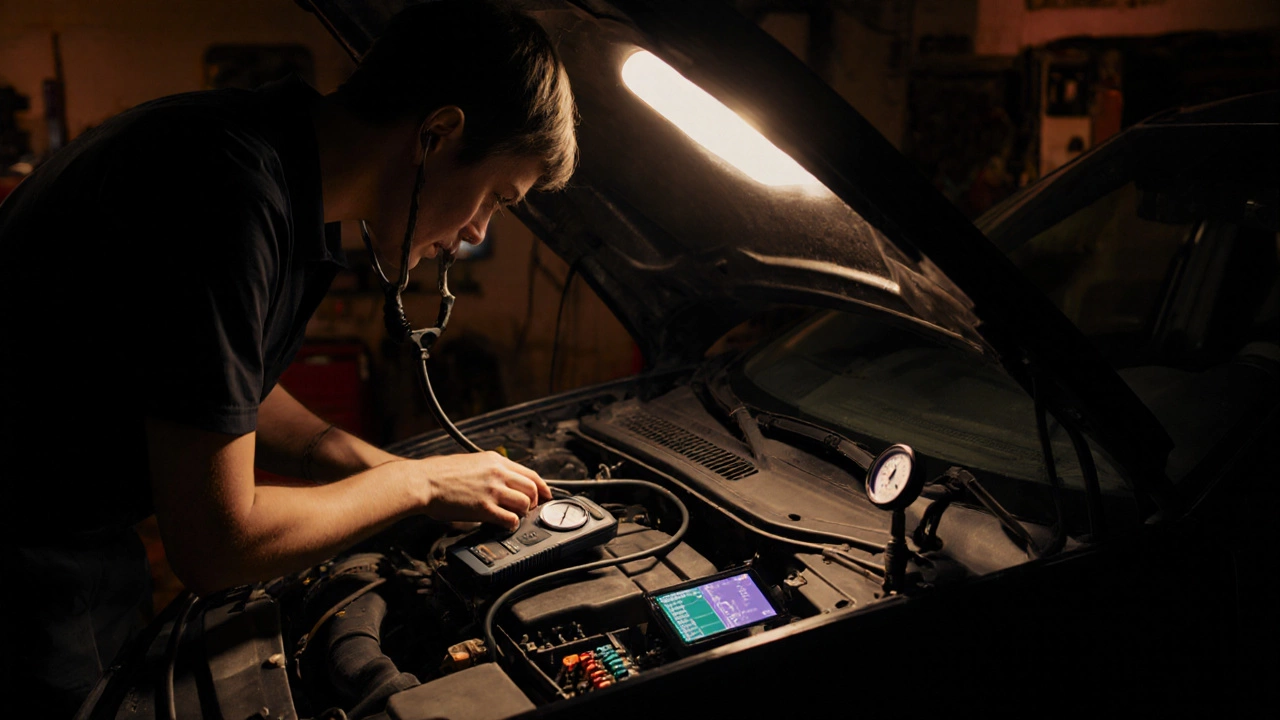
Related Components That Can Mimic Pump Noise
It’s worth noting that not all noises originate from the pump. A few other parts often get blamed incorrectly:
- Fuel Filter a screen that removes contaminants before fuel reaches the pump - a clogged filter can cause a low‑volume whine.
- Fuel Injector sprays fuel into the combustion chamber - a misfiring injector may produce a ticking sound that sounds similar to a pump click.
- Electrical issues in the fuel pump relay the switch that powers the pump can generate clicking noises independent of pump wear.
If you’ve ruled out these components, the odds are the pump itself is the problem.
Preventive Tips to Keep Your Pump Quiet
Maintaining a healthy fuel system reduces the chance of noisy failures. Here are some practical habits:
- Keep the fuel tank at least a quarter full. Running on low fuel causes the pump to work harder and can introduce air bubbles that create cavitation sounds.
- Replace the fuel filter as per the manufacturer’s schedule (often every 30,000 miles).
- Use high‑quality fuel from reputable stations. Poorly refined gasoline can contain sediments that wear pump components.
- Periodically run a fuel system cleaner additive. It helps dissolve deposits that can strain the pump.
Following these steps not only silences the pump but also prolongs engine life.
Frequently Asked Questions
What does a whining fuel pump sound like compared to the engine?
A whining fuel pump produces a high‑pitched, continuous tone that rises with engine RPM, whereas the engine’s normal roar is lower‑frequency and mixed with exhaust notes. The pump whine stands out especially when the vehicle is idling.
Can a failing fuel pump cause my car to hesitate on acceleration?
Yes. When the pump can’t maintain pressure, the engine receives less fuel during a throttle increase, leading to hesitation, sputtering, or a momentary loss of power.
Is a clicking noise always a fuel pump issue?
Not always. Clicking can also come from a failing relay or a loose electrical connector. However, if the click is synchronized with engine speed and accompanied by low fuel pressure, the pump is the likely source.
How can I test fuel pressure at home?
A handheld fuel pressure gauge can be attached to the test port on the fuel rail. With the engine running at idle, the gauge should read within the specs listed in the vehicle’s service manual (usually 30‑45 psi). Deviations indicate pump or filter problems.
Will a fuel pump replacement eliminate all strange noises?
If the noise directly stems from pump wear, replacement will silence it. But if the sound originates from downstream components like injectors or the fuel filter, you’ll need to address those parts as well.

